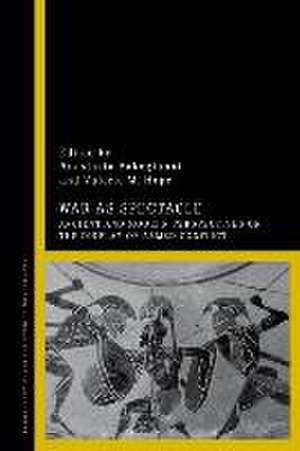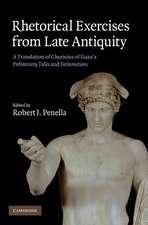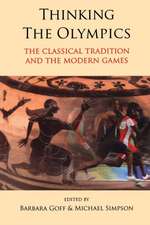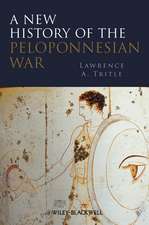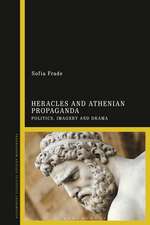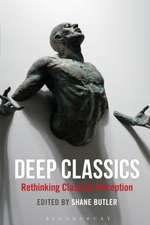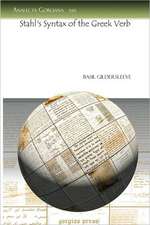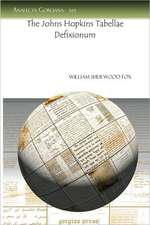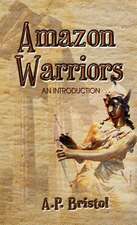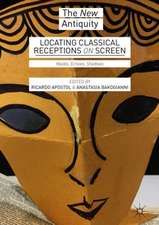War as Spectacle: Ancient and Modern Perspectives on the Display of Armed Conflict
Editat de Anastasia Bakogianni, Dr Valerie M. Hopeen Limba Engleză Hardback – 21 oct 2015
| Toate formatele și edițiile | Preț | Express |
|---|---|---|
| Paperback (1) | 245.11 lei 22-36 zile | |
| Bloomsbury Publishing – 19 oct 2016 | 245.11 lei 22-36 zile | |
| Hardback (1) | 1013.72 lei 43-57 zile | |
| Bloomsbury Publishing – 21 oct 2015 | 1013.72 lei 43-57 zile |
Preț: 1013.72 lei
Preț vechi: 1295.52 lei
-22% Nou
Puncte Express: 1521
Preț estimativ în valută:
194.04€ • 210.84$ • 163.10£
194.04€ • 210.84$ • 163.10£
Carte tipărită la comandă
Livrare economică 21 aprilie-05 mai
Preluare comenzi: 021 569.72.76
Specificații
ISBN-13: 9781472522290
ISBN-10: 147252229X
Pagini: 472
Ilustrații: 15 bw illus
Dimensiuni: 156 x 234 x 30 mm
Greutate: 0.86 kg
Editura: Bloomsbury Publishing
Colecția Bloomsbury Academic
Locul publicării:London, United Kingdom
ISBN-10: 147252229X
Pagini: 472
Ilustrații: 15 bw illus
Dimensiuni: 156 x 234 x 30 mm
Greutate: 0.86 kg
Editura: Bloomsbury Publishing
Colecția Bloomsbury Academic
Locul publicării:London, United Kingdom
Caracteristici
Ancient warfare has enjoyed an explosion of interest in recent years
Notă biografică
Anastasia Bakogianni is Fellow at the Institute of Classical Studies of the University of London, UK, and is the author of Electra Ancient and Modern: Aspects of the Tragic Heroine's Reception (2011).Valerie M. Hope is Senior Lecturer in Classical Studies at The Open University, UK. Her works include Roman Death: The Dying and the Dead in Ancient Rome (Bloomsbury 2009), Death in Ancient Rome: A Sourcebook (2007) and Constructing Identity: The Roman Funerary Monuments of Aquileia, Mainz and Nîmes (2001).
Cuprins
List of IllustrationsAcknowledgementsNotes on Contributors1 Introduction: War as Spectacle, a Multi-sensory Event Worth Watching? Anastasia BakogianniPart 1 Ancient and Modern Literary Spectacles of War A. Epic Spectacles 2 'What if We Had a War and Everybody Came?': War as Spectacle and the Duel of Iliad 3 (Tobias Myers, Connecticut College, USA)3 From Our Own Correspondent: Authorial Commentary on the 'Spectacles of War' in Homer and in the Tale of the Heike (Naoko Yamagata, The Open University, UK)4 'The Clash of Weapons and the Sight of War': Spectatorship and Identification in Roman Epic (Neil W. Bernstein, Ohio University, USA)5 Death on the Margins: Statius and the Spectacle of the Dying Epic Hero (Helen Lovatt, University of Nottingham, UK)B. Poetical, Historiographical and Philosophical Spectacles 6 Lyric Visions of Epic Combat: The Spectacle of War in Archaic Personal Song (Laura Swift, The Open University, UK)7 'The Greatest Runway Show in History': Paul Violi's 'House of Xerxes' and the Herodotean Spectacle of War (Emma Bridges, The Open University, UK)8 Plato's Cinematic Vision: War as Spectacle in Four Dialogues (Laches, Republic, Timaeus and Critias) (Andrea Capra, Universita degli Studi di Milano, Italy)9 Shadow-Boxing in the East: The Spectacle of Romano-Parthian Conflict in Tacitus (Rhiannon Ash, University of Oxford, UK)10 Bodies on the Battlefield: The Spectacle of Rome's Fallen Soldiers (Valerie M. Hope, The Open University, UK)Part 2 Spectacles of War in Material Culture11 The Monument and Altar to Liberty: A Memory Site for the United States' Own Thermopylae (Jared A. Simard, CUNY, USA)12 Triumphal Washington: New York City's First 'Roman' Arch (Elizabeth Macaulay-Lewis, CUNY, USA)13 An Unwinding Story: The Influence of Trajan's Column on the Depiction of Warfare (Andrew Fear, University of Manchester, UK)Part 3 Spectacles of War on Stage and in Modern Media14 Epic Parodies: Martial Extravaganzas on the Nineteenth-Century Stage (Justine Mc Connell, University of Oxford, UK)15 Parading War and Victory under the Greek Military Dictatorship: The Hist(o)rionics of 1967-74 (Gonda Van Steen, University of Florida, USA)16 The Anti-War Spectacle: Denouncing War in Michael Cacoyannis' Euripidean Trilogy (Anastasia Bakogianni, The Open University, UK)17 Terrence Malick's The Thin Red Line and Homeric Epic: Spectacle, Simile, Scene and Situation (Jon Hesk, University of St Andrews, UK)18 Animating Ancient Warfare: The Spectacle of War in the Panoply Vase Animations (Sonya Nevin, University of Roehampton, UK)NotesBibliographyIndex
Recenzii
The book's greatest strength, apart from the fascinating breadth of topics under discussion, comes from its editorial organisation, which brings a logical structure with which to explore the notion of war as spectacle ... [It] offer[s] fascinating insights into Greek and Roman notions of the spectacle of war, and bring[s] into question our own fascination with warfare as a form of entertainment.
The reader ... walks away from this impressive volume with heightened awareness of the ramifications of spectacle when approaching both the ancient and modern.
A spectacular performance on every front. Ambitiously conceptualized, prefaced by a brilliant introduction that contextualizes and theorizes its eighteen essays, this volume represents interdisciplinary scholarship in classics and classical reception at its very best.
War as Spectacle offers a unique cross-cultural insight into a dramatic human experience that has shaped individual and collective identities and shaken consciences since the dawn of time. The idea of performance and of the multi-sensorial that impregnates the volume succeeds in banding together a set of original contributions that range from ancient literature and its post-Classical reception to modern commemorative art, cinema, stage and 21st century visual media. War as Spectacle provides a refreshing and stimulating view of Antiquity and its long shadow over current debates about modern war-conflicts and their impact in the age of internet and globalisation.
This book is a 400-plus-page wake-up call to classicists, warfare scholars and anyone interested in the value of the classical world as a cultural vantage point. Ancient warfare has long come into debates concerning the nature and ethics of warfare; this book shows how over-simple many of the terms of this debate have been. The editor writes: 'War as Spectacle is not your typical book on the subject of ancient warfare.' Where this book differs from other work to date is in its focus on warfare as a performance, as a multi-sensory experience, and as entertainment. The contributors consider the implications of a performative approach for reassessing how the ancients thought about war, and about the ethics of classical reception. The authors keep coming back to the issue of the distance between antiquity and the modern world. Conversely, the whole book is an exercise in reception: for instance in how commemorative monuments receive ancient battles, and in how archaic and classics authors were already reworking and rejecting a Homeric aesthetics of warfare.
The reader ... walks away from this impressive volume with heightened awareness of the ramifications of spectacle when approaching both the ancient and modern.
A spectacular performance on every front. Ambitiously conceptualized, prefaced by a brilliant introduction that contextualizes and theorizes its eighteen essays, this volume represents interdisciplinary scholarship in classics and classical reception at its very best.
War as Spectacle offers a unique cross-cultural insight into a dramatic human experience that has shaped individual and collective identities and shaken consciences since the dawn of time. The idea of performance and of the multi-sensorial that impregnates the volume succeeds in banding together a set of original contributions that range from ancient literature and its post-Classical reception to modern commemorative art, cinema, stage and 21st century visual media. War as Spectacle provides a refreshing and stimulating view of Antiquity and its long shadow over current debates about modern war-conflicts and their impact in the age of internet and globalisation.
This book is a 400-plus-page wake-up call to classicists, warfare scholars and anyone interested in the value of the classical world as a cultural vantage point. Ancient warfare has long come into debates concerning the nature and ethics of warfare; this book shows how over-simple many of the terms of this debate have been. The editor writes: 'War as Spectacle is not your typical book on the subject of ancient warfare.' Where this book differs from other work to date is in its focus on warfare as a performance, as a multi-sensory experience, and as entertainment. The contributors consider the implications of a performative approach for reassessing how the ancients thought about war, and about the ethics of classical reception. The authors keep coming back to the issue of the distance between antiquity and the modern world. Conversely, the whole book is an exercise in reception: for instance in how commemorative monuments receive ancient battles, and in how archaic and classics authors were already reworking and rejecting a Homeric aesthetics of warfare.
